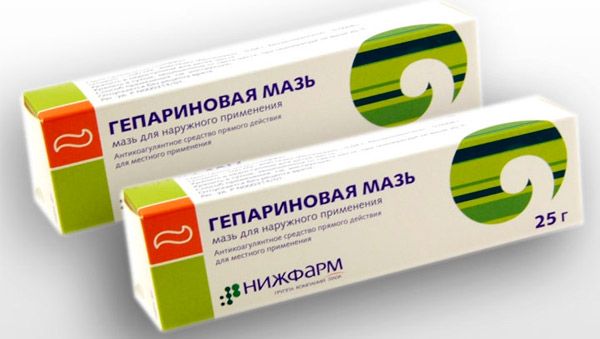Medical expert of the article
New publications
Preparations
Heparin ointment for swelling
Last reviewed: 04.07.2025

All iLive content is medically reviewed or fact checked to ensure as much factual accuracy as possible.
We have strict sourcing guidelines and only link to reputable media sites, academic research institutions and, whenever possible, medically peer reviewed studies. Note that the numbers in parentheses ([1], [2], etc.) are clickable links to these studies.
If you feel that any of our content is inaccurate, out-of-date, or otherwise questionable, please select it and press Ctrl + Enter.
Heparin ointment belongs to the pharmacological group of direct-acting anticoagulants (ATX - C05BA53), that is, this drug prevents blood clotting. However, the active substance of this drug - sodium heparin - has an effect on a wide range of other conditions, and this explains why Heparin ointment is used for edema.
According to the instructions, the main indications for the use of Heparin ointment include superficial thrombophlebitis and phlebitis of the extremities, varicose veins, bleeding of external nodes in hemorrhoids, bruises, subcutaneous hematomas. In addition, Heparin ointment is used for leg edema and various local infiltrates.
Pharmacodynamics
Heparin is a polyanionic, i.e. negatively charged, heteropolysaccharide (glycosaminoglycan) with a straight chain of covalently linked sulfate and carboxyl subunits. The anticoagulant effect of heparin is associated with its ability to increase the activity of antithrombin III (a specific protein of the blood coagulation system), resulting in the inhibition of most blood coagulation factors. And due to its significant negative charge, heparin also interacts electrostatically with thrombin (coagulation factor II), which leads to thrombin inactivation.

Since heparin is negatively charged, its molecules can bind large amounts of interstitial fluid containing various cations. Therefore, Heparin ointment for edema has an anti-exudative effect, including fluid retention in tissues.
The pharmacokinetics of Heparin ointment are not presented in the instructions by the manufacturers of the drug.
Method of administration and dosage
Heparin ointment for swelling of the legs is applied to the skin in a very thin layer, followed by light rubbing, no more than twice a day. Heparin ointment for swelling of the eyes is used in a similar way: the drug should be applied to the swollen areas under the eye sockets, but not to the eyelids (the ointment should not get into the eyes).
When applied externally, overdose of the ointment is unlikely.
Contraindications for use
Heparin ointment for edema is not used in case of any damage to the skin (abrasions, wounds, ulcers), existing skin rashes, blood clotting disorders with a low level of platelets in the blood. The use of Heparin ointment for edema during pregnancy is allowed only as prescribed by a doctor, taking into account the results of a blood test for platelets.
Side effects of Heparin ointment for edema
The main side effects that Heparin ointment for edema can cause are redness of the skin at the site of application, hives and itching.
Interactions with other drugs
Heparin ointment for edema should not be used when taking tetracycline antibiotics, non-steroidal anti-inflammatory drugs and anti-allergic antihistamines.
Storage conditions: at a temperature of +12-15°C.
The expiration date is indicated on the drug packaging.
Attention!
To simplify the perception of information, this instruction for use of the drug "Heparin ointment for swelling" translated and presented in a special form on the basis of the official instructions for medical use of the drug. Before use read the annotation that came directly to medicines.
Description provided for informational purposes and is not a guide to self-healing. The need for this drug, the purpose of the treatment regimen, methods and dose of the drug is determined solely by the attending physician. Self-medication is dangerous for your health.


 [
[